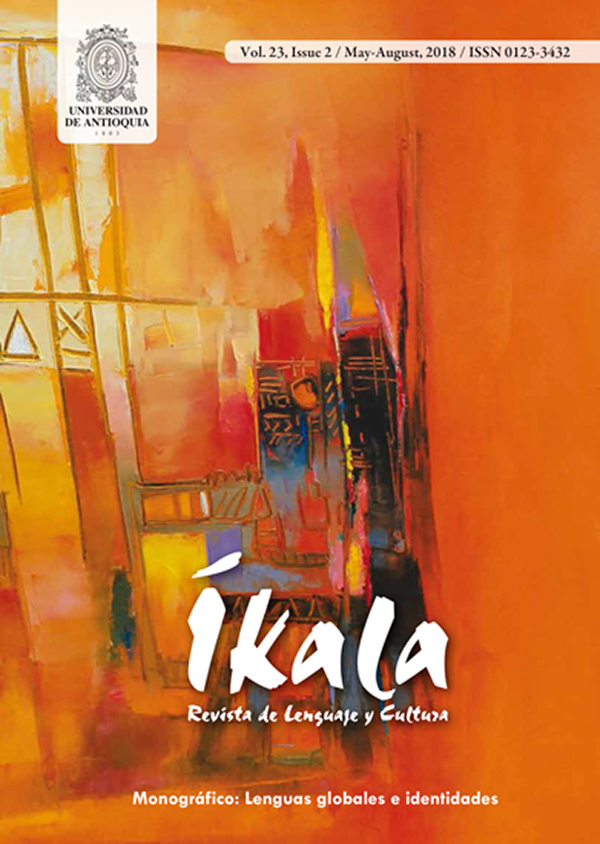Indigenous Students Learning English in Higher Education: Challenges and Hopes
DOI:
https://doi.org/10.17533/udea.ikala.v23n02a03Keywords:
language policies, indigenous students, English language learning, critical interculturality, decolonial theoriesAbstract
The increasing enforcement of English language policies in higher education represents a significant challenge for indigenous students entering Colombian universities. Researchers in this study worked on a sociolinguistic profile of over 300 indigenous students at Universidad de Antioquia and, from a critical decolonial perspective, aimed to understand the multiple views and challenges these students face in relation to their identities, languages, academic literacies, and the most recent institutional language policy that requires them to learn English to earn their university degrees. Data collection methods included several institutional databases, a survey, interviews, and conversation circles. Results from this study suggest that more equitable pedagogical principles coupled with a more sensitive and effective appropriation and implementation of this type of reform in higher education institutions are both necessary. These measures would prevent that learning English for indigenous students becomes an obstacle to complete their tertiary education in conditions of justice, respect, and a real validation of their ancestral languages, cultures, and knowledge.
Downloads
References
Aboites, H. (2010). La educación superior latinoamericana y el proceso de Bolonia: De la comercialización al proyecto tuning de competencias. Cultura Y Representaciones Sociales, 5(9), 122–144. Retrieved from http://goo.gl/yZmbQq
AERA. (2011). AERA Code of Ethics: American Educational Research Association Approved by the AERA Council February 2011. Educational Researcher, 40(3), 145–156. http://doi.org/10.3102/0013189X11410403
Education First. (2016). English Proficiency Index (EF EPI). Retrieved from http://www.ef.co.uk/epi/
García, D., & Garcia, J. (2014). Educación bilingüe y pluralidad: Reflexiones en torno de la interculturalidad crítica. Cuadernos de Lingüística Hispánica, (23), 49–65. Retrieved from https://goo.gl/tkNz5v
Granados-Beltrán, C. (2016). Critical Interculturality. A Path for Pre-service ELT Teachers. Íkala, Revista de Lenguaje Y Cultura, 21(2), 171–187. http://doi.org/10.17533/udea.ikala.v21n02a04
OECD. (2016). Education in Colombia: Reviews of national policies for education. Paris: OECD Publishing. http://doi.org/10.1016/S0022-3913(12)00047-9
OECD, & International Bank for Reconstruction and Development/The World Bank. (2012). Reviews of national policies for education: Tertiary education in Colombia 2012. OECD Publishing. OECD Publishing. Retrieved from https://goo.gl/2qnWtG
Phillipson, R. (1992). Linguistic imperialism. New York: Oxford University Press. Retrieved from https://goo.gl/G7Tgih
Phillipson, R. (2003). English-only Europe? Challenging language policy. London: Routledge. Retrieved from http://goo.gl/K7XsTp
Phillipson, R. (2009). English in globalisation, a lingua franca or a fingua Frankensteinia? TESOL Quarterly, 43(2), 335–339. Retrieved from http://goo.gl/tDZOzX
Quinchía, D. I., Muñoz, J. H., & Sierra, N. (2015). Evaluación del contexto de un programa de competencia lectora en inglés en una universidad pública en Colombia a través del Modelo de Evaluación CIPP. Íkala, Revista de Lenguaje Y Cultura, 20(3), 293–314. http://doi.org/10.17533/udea.ikala.v20n3a02
Restrepo, E., & Rojas, A. (2010). Inflexión decolonial: Fuentes, conceptos y cuestionamientos. Popayán: Editorial Universidad del Cauca. Retrieved from http://scholar.google.com/scholar?hl=en&btnG=Search&q=intitle:No+Title#0
Ricento, T. (Ed.). (2000). Ideology, politics, and language policies: Focus on English. Amsterdam: John Benjamins Publishing Co. Retrieved from http://goo.gl/xK2JiZ
Richards, K. (2003). Qualitative Inquiry in TESOL. Basingstoke, UK: Palgrave Macmillan. http://doi.org/10.1057/9780230505056
Sierra, Z. (Ed.). (2004). Voces indígenas universitarias. Expectativas, vivencias y sueños. Medellín, Colombia: Editorial Marín Vieco Ltda. Retrieved from https://goo.gl/ydhA8e
Stake, R. E. (2010). Qualitative research: Studying how things work. New York: The Guilford Press. Retrieved from http://goo.gl/kU2qqm
Tubino, F. (2005). La praxis de la interculturalidad en los Estados Nacionales Latinoamericanos. Cuadernos Interculturales, 3(5), 83–96. Retrieved from http://www.redalyc.org/articulo.oa?id=55200506
Universidad de Antioquia (2018). Inicia Cátedras UdeA Diversa. Retrieved from: https://goo.gl/Cvz2k6
Usma, J., Quinchía, D., & Rodas, J. D. (2013, August). En inglés Colombia está out. Alma Máter, p. 23. Medellín, Colombia. Retrieved from https://goo.gl/98XkZi
Walsh, C. (2009). Interculturalidad crítica y pedagogía de-colonial: Apuestas (des)de el in-surgir, re-existir y re-vivir. In P. Medina (Ed.), Educación intercultural en América Latina: Memorias, horizontes históricos y disyuntivas políticas (pp. 25–42). México, D. F.: Plaza y Valdés, S. A.
Walsh, C. (2010). Interculturalidad crítica y educación intercultural. In Construyendo interculturalidad crítica (pp. 75–96). La Paz: III-CAB. Retrieved from https://goo.gl/9tTPFR
Yin, R. K. (2011). Qualitative research from start to finish. New York: The Guilford Press. Retrieved from http://goo.gl/D2MpkG
Published
How to Cite
Issue
Section
License
Copyright (c) 2018 Íkala

This work is licensed under a Creative Commons Attribution-NonCommercial-ShareAlike 4.0 International License.












